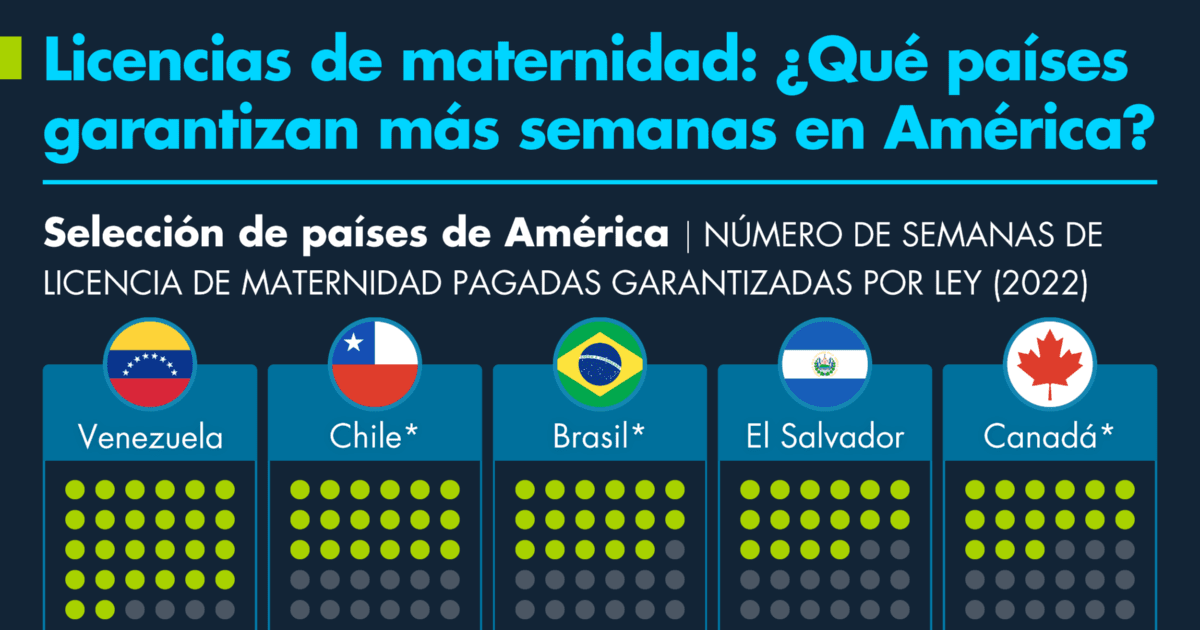The disparity between the countries of this continent is also observed in the maternity leave. However, a couple of countries with small economies are the most advanced on the subject. The International Labor Organization (ILO) establishes a minimum permit for 14 paid weeksbut Venezuela grants 26 and Cuba, 18. On the other hand, Mexico grants 12 and the United States, none.
The maternity protection “It is a human right and an essential element of comprehensive work and family policies,” says Unicef. Caring for a newborn and working put mothers at a higher level of stress, and their babies are less likely to be breastfed, she says.
According to the report Maternity and paternity in the workplace in Latin America and the Caribbeanfrom Unicef, longer paid leaves “are an important policy for recognize the burden of care workwhich is generally unpaid and is predominantly carried out by women”.
Article 170 of the Federal Labor Law (LFT) contemplates “a rest of six weeks before and six weeks after childbirth”; in sum, 12 weeks. Only if a baby was born with some type of disability or requires hospitalization, it is extended two more weeks.
“It’s very little time,” especially for those who decide to breastfeed, says Trycssy Mari. Her twins were born in June 2021 and at two months the three of them were barely achieving a rhythm in breastfeeding. Because of the pandemic was able to telework From the time she was five months pregnant and after giving birth, she was able to spend more time at home, but she has already returned to the office.
Now it is his wife who takes care of the baby care when she goes to work. In addition to care work, her partner works from home running the online store they started together.
Tricssy Mari is a graphic designer at a media company. “The hardest thing about going back is that there is no lactation room and at first I had to express my milk in the bathroom. Sometimes the gadgets fell on the floor and it’s not like anything else, it’s to get the baby food, ”he emphasizes.
From his case, the company enabled as nursery room a room they had for audio recording. “I think they lacked knowledge of how to deal with a mother, but they have been learning, they have treated me well, but I would like to continue with remote work.” Telecommuting is a job option Given the reduced maternity leave, however, perhaps the company she works for has not seen it that way.
Obstacles to the license
In 2000, the member states of the ILO adopted the Convention 183 on the protection of maternity, where it is established that maternity leave must last at least 14 weeks and must be paid. But only 41 countries have ratified it, Mexico is not among them.
USA, a lot less. It is the only country in the Organization for Economic Co-operation and Development (OECD) that does not have paid maternity or paternal leave. The mothers can safely take up to 12 weeks to be laid off, but they are not paid.
And although such a care policy exists in Mexico, it is conditioned to formal work. That leaves out 61% of working women, since they work informally, according to the National Survey of Occupation and Employment (ENOE). However, having a formal job does not guarantee access to this right. Dismissal for pregnancy is the main complaint received by the National Council to Prevent Discrimination (Conapred).
Another obstacle, as Tricssy Mari points out, is that 12 legal weeks they are insufficient.
In the Senate there are five initiatives to extend licenses, two are only for fathers and three also contemplate mothers. One of them asks that they be three months with salary.
The Chamber of Deputies has received five proposals to extend permission, four of them are for parents. The fifth, by deputy Noemí Salazar (Morena), proposes a two-month license with pay for those who work in the service of the State and make up a lesbian-maternal or homo-parental family.
Research on these families “shows that they are more egalitarian in the distribution of paid and unpaid jobs”, indicates the report An approach to the social welfare of lesbian and homoparental families, by Luz María Galindo Vilchis, published by Oxfam.
“If my wife had a job in a company, surely they would not have given her a license because she was not the surrogate mother. The system treats us for convenience, sometimes they make her look like she was her father or as if she had no right to anything. They don’t understand this family model in which both of us truly participate, we are both even stopping our professional development to be mothers, we should have the same rights”, claims Tricssy Mari.








